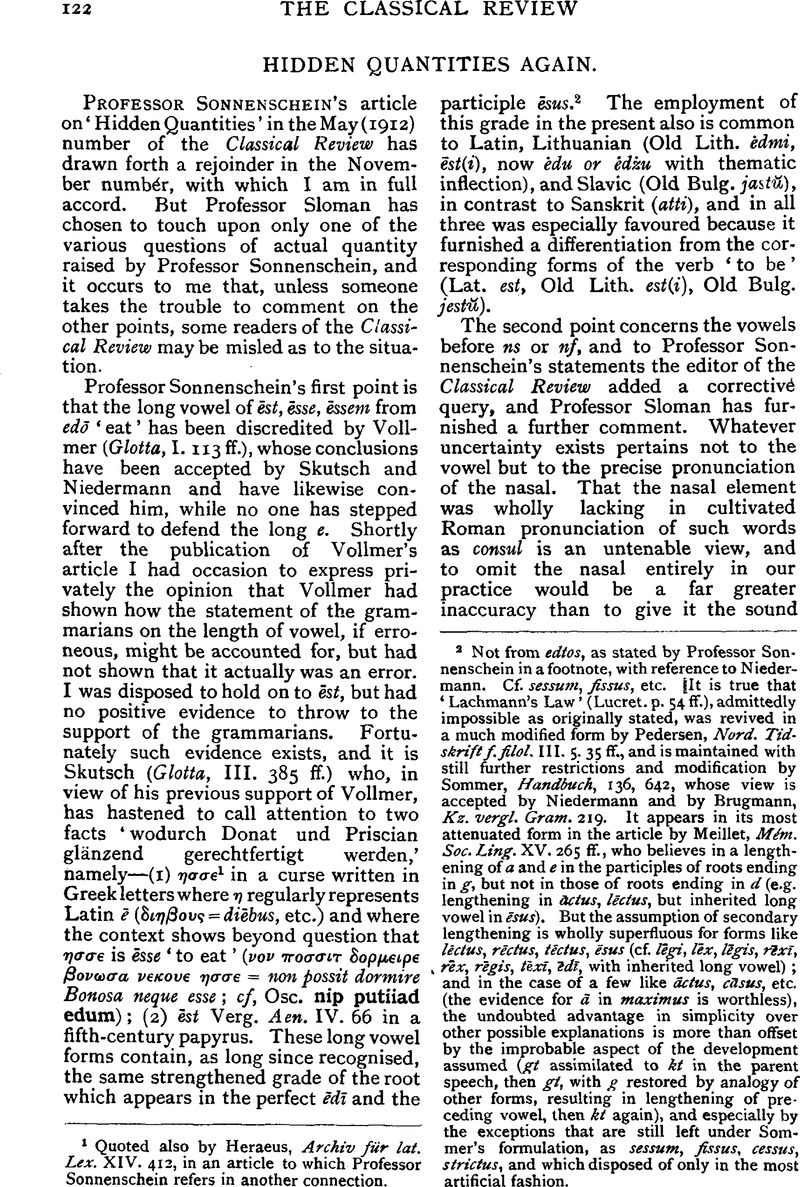Article contents
Hidden Quantities Again
Published online by Cambridge University Press: 27 October 2009
Abstract

- Type
- Original Contributions
- Information
- Copyright
- Copyright © The Classical Association 1913
References
page 122 note 1 Quoted also by Heraeus, , Archiv für lat. Lex. XIV. 412Google Scholar, in an article to which Professor Sonnenschein refers in another connection.
page 122 note 2 Not from edtos, as stated by Professor Sonnenschein in a footnote, with reference to Niedermann. Cf. sessum, fissus, etc. It is true that ‘Lachmann's Law’ (Lucret. p. 54 ff.), admittedly impossible as originally stated, was revived in a much modified form by Pedersen, , Nord. Tidskrift f. filol. III. 5. 35 ff.Google Scholar, and is maintained with still further restrictions and modification by Sommer, , Handbuch, 136, 642Google Scholar, whose view is accepted by Niedermann, and by Brugmann, , Kz. vergl. Gram. 219Google Scholar. It appears in its most attenuated form in the article by Meillet, , Mém. Soc. Ling. XV. 265 ff.Google Scholar, who believes in a lengthening of a and e in the participles of roots ending in g, but not in those of roots ending in d (e.g. lengthening in āctus, lēctus, but inherited long vowel in ēsus). But the assumption of secondary lengthening is wholly superfluous for forms like lēctus, rēctus, tēctus, ēsus (cf. lēgi, lēx, lēgis, rēxī, rēx, rēgis, tēxī, ēdī, with inherited long vowel); and in the case of a few like āctus, cāsus, etc. (the evidence for ā in maximus is worthless), the undoubted advantage in simplicity over other possible explanations is more than offset by the improbable aspect of the development assumed (gt assimilated to kt in the parent speech, then gt, with g restored by analogy of other forms, resulting in lengthening of preceding vowel, then kt again), and especially by the exceptions that are still left under Sommer's formulation, as sessum, fissus, cessus, strictus, and which disposed of only in the most artificial fashion.
page 123 note 1 Cf. Koeppel, , Spelling Pronunciations (Quellen und Forschungen, 89)Google Scholar; Jespersen, Modern English Grammar (see index under ‘Spelling Pronunciations’).
page 123 note 2 Fortunately the pupil need not be troubled by this. Nor is the fact that we teach dogmatically, one way or another, some quantities which are really doubtful, an admission that we should ignore the whole matter, and thus deliberately teach many quantities which we know to be false.
- 1
- Cited by




